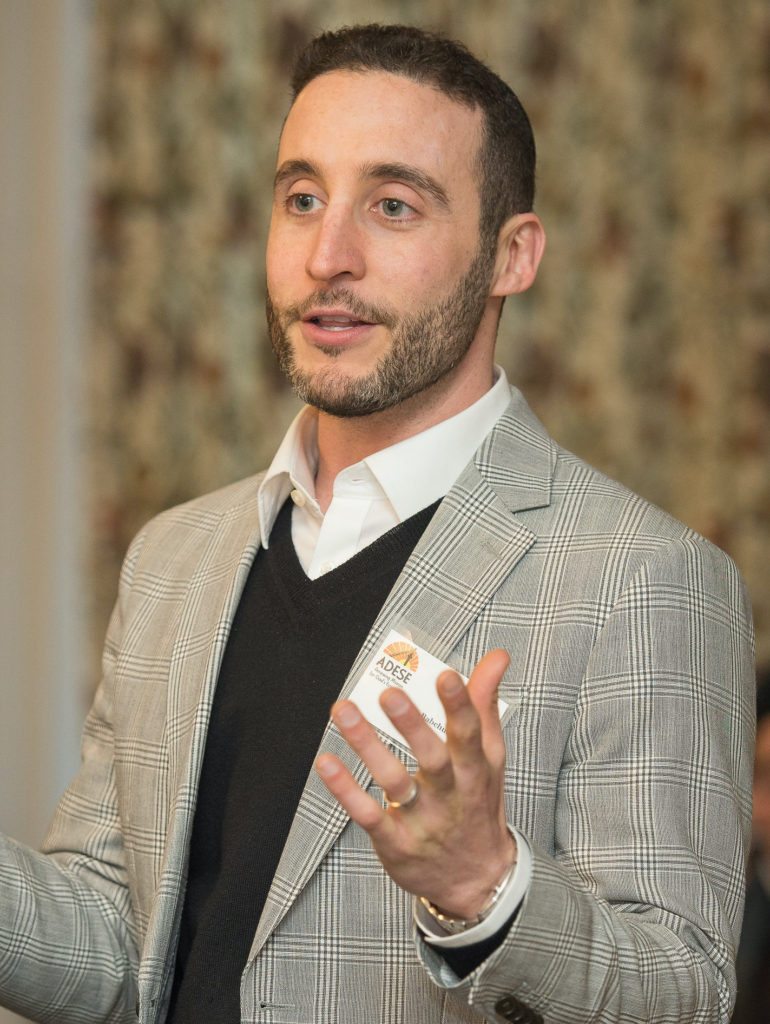This past weekend my wife Lizzie and I took a short trip to Miami Beach, anticipating long, lazy days on the beach, slow, sumptuous meals, and – with our three kids safely in the hands of their grandparents – some much-needed quiet. After two years of weathering the pandemic at home and an especially brutal Northeast winter, we were practically pinching ourselves once the plane finally took off and our trip had officially begun.
For what it’s worth, our first few hours went mostly according to plan. We checked in, dropped off our bags, meandered in and out of shops and restaurants until we found what we were looking for, and relaxed by the pool for the truly strange experience of reading our books uninterrupted. While it wasn’t quiet, per se, it was quite peaceful. And we knew the quiet would eventually arrive later that night, both of us anticipating a full night of sleep for the first time in who knows how long.
But as it turns out, just because I’m too old to have any awareness of Spring Break doesn’t mean that it no longer exists. Somehow, in search of peace and quiet, I had managed to book a vacation in the heart of South Beach, right in the middle of Spring Break. And no combination of towels under the door, white noise machines on full blast, or Ken Burns documentaries was going to change the fact that thousands of people half my age with much later bedtimes had made the same trip as we did, with completely opposite intentions.
But I’m not writing this piece just to bemoan my lack of silence, nor to extol its virtues. We all know quite well that we live in a cacophonous time of knee-jerk reactions, squeaky wheels, and the unfortunate mechanisms in social media that entice and reward the noisiest among us. Silence might be golden, but shouting goes platinum.
What I do want to offer, however, is a simple provocation. An interrogation of silence, perhaps.
In this week’s Torah reading, we read of the unimaginable deaths of Nadav and Avihu, Aaron’s sons who offer a sacrifice to God and almost immediately are consumed by the fire sent from God (Leviticus 10:1-2). The punishment seems confoundingly incommensurate – we’re not even completely sure why using “strange fire” that had not been commanded of them would yield God’s wrath. But what’s even more out of the ordinary is Aaron’s response.
“And Aaron was silent.” He didn’t cry out. He didn’t shout. He didn’t scream indignantly. Crickets.
To hold back completely seems almost impossible in the face of such a tragic loss. In fact, I want to make clear that – from a mental health perspective – in no way do I think his reaction is a healthy one to be emulated. Loss hurts, and unprocessed grief can do unthinkable damage. And while the rabbis have a field day offering commentary on his silence (he was being virtuous, he was in shock, and so on), there is one interpretation that I found particularly provocative:
The Netziv – a 19th-century Russian rabbi – offered this: “This silence was not a silence of sorrow, nor was it a silence of mourning. This silence was an admission. By remaining silent, Aaron acknowledged that he had sinned in the episode of the Golden Calf and that his sons died because of his sin.”
Rather than rushing to judgment of his sons or blaming God for the harshness of their punishment, Aaron located himself within the very same system that had caused their death. And he sat with the possibility that he was, in fact, complicit. Yes – like his sons, Aaron was indeed a victim of that system. But his silence conveyed a critical revelation: One can be both a victim of and complicit in the ills of any given system.
As I tossed and turned and cursed the spring breakers who so clearly had descended upon South Beach for the sole purpose of ruining my night of sleep, I wondered if I could possibly discern a meaningful signal amidst all of this noise. Eventually, in the wee hours of the morning, I did: just because I had opted for an early night doesn’t mean that I’m not part of the system that created all of this chaos in the first place.
Didn’t I join my friends all those years ago to celebrate a week away from college in warm places just like South Beach? And just because Lizzie and I were looking forward to cultural experiences like the graffiti art at Wynwood Walls and the birds of paradise at the botanical gardens (and not the yards of Bud Light at Señor Frog’s), that doesn’t eliminate the fact that I picked South Beach for many of the same reasons that those thousands of college students did (proximity to the airport, plenty of beautiful beaches, etc). Sure, I was a “victim” of Spring Break, but as soon as I pushed myself to do some self-reflection, I realized that I was a complicit part of it, too.
We humans have built an incredibly powerful defense mechanism: as soon as we feel indignant about the latest news (often rightfully so), we instinctually extract ourselves from the system(s) that caused it. We create an “us” and “them” paradigm that safely embeds “us” in the right, and “them” in the wrong. It helps us protect our fragile psyches from the frightening possibility that the victim/perpetrator duality that we’ve embraced might be more complicated than we think.
To quote my teacher Rabbi Irwin Kula – when it comes to “cracking the nut” and solving whatever problems we’re faced with, we unerringly see ourselves as the nutcracker, but never the nut.
Rav Avraham Isaac Kook, a groundbreaking 19th-20th century rabbi, once said: “I don’t speak when I have the energy to speak. I speak when I don’t have the energy to keep quiet.”
Still working to catch up on lost sleep from our vacation, I write this, in fact, with very little energy, but perhaps just enough to know that that next time I find that familiar, safe feeling of righteous indignation rising up inside of me, I’ll do precisely what Aaron once bravely did in the face of unthinkable circumstances: he mustered up the strength to sit in silence long enough to see a more complicated drama unfolding, one in which he actually played a key role.

Rabbi Elan Babchuck is committed to leaving behind a world that is more compassionate and connected than the one he found. In pursuit of that commitment he serves as the Executive Vice President at Clal, the National Jewish Center for Learning and Leadership, and the Founding Executive Director of Glean Network, which partners with Columbia Business School. He was ordained in 2012, and earned his MBA that year, as well.
A sought-after thought leader, he has delivered keynotes at stages ranging from TEDx to the US Army’s General Officer Convocation, published in The Atlantic, The Guardian, Washington Post, and Religion News Service, has a column for The Wisdom Daily, contributed to Meaning Making – 8 Values That Drive America’s Newest Generations (2020, St. Mary’s Press) and is the co-author of the forthcoming book Picking Up the Pieces: Leadership After Empire (2023, Fortress Press).
He also serves as:
a Founding Partner of Starts With Us, a movement to counteract toxic polarization in America,
a Research Advisory Board Member of Springtide Research Institute, which focuses on spirituality, mental health and Gen Z,
a founding board member of Beloved Network, a network of startup Jewish communities, and
a member of the Board of Advisors of the Changemaker Initiative.
He lives in Providence, Rhode Island with his wife, Lizzie Pollock, and their three children: Micah, Nessa, and Ayla. In his spare time, he finds sanctuary while climbing rock walls around New England and tending to his backyard garden.

